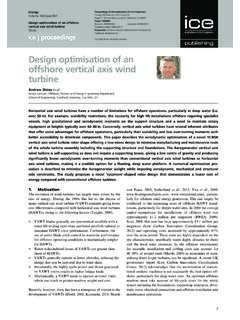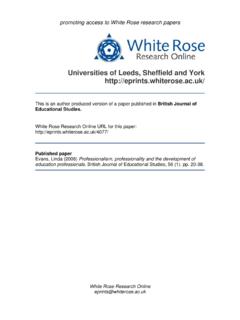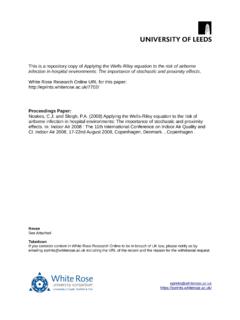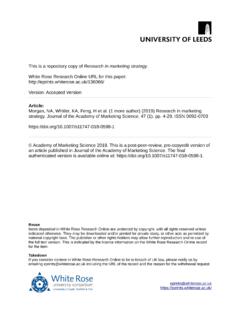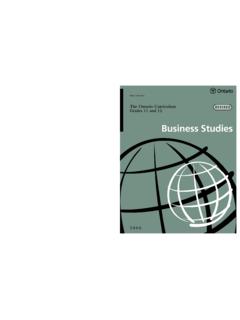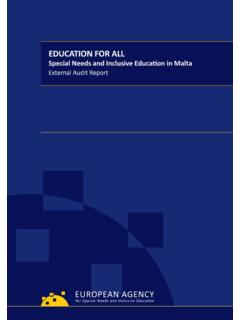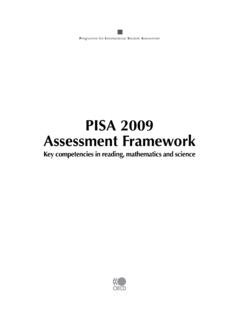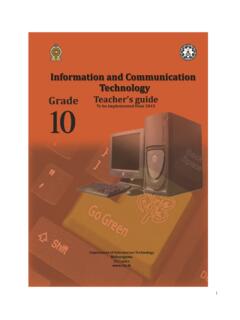Transcription of Improving oracy and classroom talk : achievements and ...
1 This is a repository copy of Improving oracy and classroom talk : achievements and Rose Research Online URL for this paper: : Submitted VersionArticle:Alexander, Robin John (2013) Improving oracy and classroom talk : achievements and challenges. Primary First. pp. 22-29. Items deposited in White Rose Research Online are protected by copyright, with all rights reserved unless indicated otherwise. They may be downloaded and/or printed for private study, or other acts as permitted by national copyright laws. The publisher or other rights holders may allow further reproduction and re-use of the full text version. This is indicated by the licence information on the White Rose Research Online record for the item.
2 Takedown If you consider content in White Rose Research Online to be in breach of UK law, please notify us by emailing including the URL of the record and the reason for the withdrawal request. Improving oracy AND classroom TALK IN ENGLISH SCHOOLS: achievements AND CHALLENGES Robin Alexander University of Cambridge Extended and referenced version of a presentation given at the DfE seminar on oracy , the National Curriculum and Educational Standards, 20 February 2012 Introduction The seminar for which this paper was prepared had a double impetus: the ninth chapter ( Oral language and its development within the National Curriculum ) of the December 2011 report of the National Curriculum (NC) Review Expert Panel, and the international conference Socialising Intelligence Through Academic Talk and Dialogue which was sponsored by the American Educational Research Association (AERA)
3 And took place in Pittsburgh three months earlier, in September The AERA conference was significant in all kinds of ways, but in the policy context it was notable for confirming, from a now critical mass of robust evidence, that the quality of classroom talk has a measurable impact on standards of attainment in English, mathematics and science. Immediately after the conference (30 September 2011) I wrote to the Secretary of State, copying in the NC Review Expert Panel, Ofsted and the Department s review of professional standards, to alert him to the implications for oracy in the national curriculum and for the way pedagogy is handled in school inspections, teacher training and professional standards.
4 There followed meetings with the Schools Minister (1 December 2011), DfE officials (17 November 2011, 24 January 2012), the chair of the Professional Standards Review (2 November 2011), the chair of the Expert Panel (20 October 2011) and Ofsted (1 December 2011). The Expert Panel report took up the message from Pittsburgh, though briefly and without attribution. The 20 February DfE seminar was the latest stage in this process, and the AERA connection was reinforced by the videolink contribution of Lauren Resnick, who conceived and directed the Pittsburgh conference and is one of America s most distinguished educational researchers and the architect of accountable talk.
5 2 It seems to me that the evidence as it now stands presents us with a pretty clear choice: In a radical act of joined- up policy we can begin to secure simultaneous leverage on the quality of classroom talk and hence student learning outcomes through the prescribed curriculum, non - statutory guidance, assessment for learning, inspection, teacher training and professional standards. 1 DfE (2011) The Framework for the Curriculum: a report by the Expert Panel for the National Curriculum Review, pp 52- 4; Resnick, , Asterhan, C.
6 , Clarke, C. and Hofkens, T. (ed) (forthcoming) Socializing Intelligence [papers from the AERA Pittsburgh conference], Washington DC: AERA. 2 Resnick, L. B., Michaels, S., & O'Connor, C. (2010), How (well structured) talk builds the mind in R. Sternberg & D. Preiss (Eds.), From genes to context: new discoveries about learning from educational research and their applications, New York, Springer; Michaels, S., O'Connor, C., & Resnick, L. B. (2008), Deliberative discourse idealized and realized: accountable talk in the classroom and in civic life , Studies in Philosophy and Education, 27(4), 283- 297.
7 2 Or we can tweak at the margins of speaking and listening in the National Curriculum, hope that teachers get the message, leave the Ofsted quality of teaching judgement as it stands, and gloss over the glaring and inexcusable mismatch between the new professional standards and what the international evidence tells us about the constituents of competent and outstanding If we or rather the government, national agencies and providers of initial teacher training and CPD take the easy route, then on past form it is clear that the nation s schools will carry on pretty much as before, some of them using talk in the ways that the evidence dictates that all of them should, while elsewhere the potential of talk to transform teaching and learning remains barely understood and inadequately exploited, to the detriment of the education of yet another generation of the nation s children.
8 In my letter to the Secretary of State of 30 September 2011 I presented six propositions: 1. We have known for a long time that talk is essential to children s thinking and learning, and to their productive engagement in classroom life, especially in the early and primary years. We now have additional evidence, from over 20 major international studies, that high quality classroom talk raises standards in the core subjects as typically measured in national and international tests. 2. There can no longer be any doubt that oracy should feature prominently within the statutory national curriculum.
9 3. We need a different kind of talk from teachers in order to extend the repertoire of pupil talk and raise the standard and cognitive impact of classroom talk overall. 4. Though the terms speaking and listening and communication skills indicate objectives of indisputable educational significance, they have become devalued by casual use and should be replaced by terms that signal the emphatic step change in thinking and practice that is needed. oracy is a neologism which some find unappealing; spoken language fits the bill reasonably well, though it doesn t have the connotation of acquired skill that, by analogy with literacy , oracy possesses.
10 5. There is a strong case for revisiting the 1975 Bullock Report s advocacy of language across the curriculum in order to underline the argument that educationally productive talk is the responsibility of all teachers, not just those who teach English. 6. Since this is about the quality of teaching as well as the content of the curriculum, it has implications not only for the NC review but also for initial teacher training, CPD, inspection and professional standards. In its evidence to the NC Review the Cambridge Primary Review wh ose final report highlighted the importance of high quality talk as fundamental to effective learning and teaching4 took the penultimate point rather further.

